Planning worship?
Check out our sister site, ZeteoSearch.org,
for 20+ additional resources related to your search.
- |
User Links
Person Results
Christoph Carl Ludwig von Pfeil
1712 - 1784 Person Name: Christoph Carl Ludw. v. Pfeil Author of "Wohl einem Haus, wo Jesus Christ" in Gesangbuch mit Noten Pfeil, Christoph Carl Ludwig, Baron von, was born January 20, 1712, at Grünstadt, near Worms, where his father, Quirin Heinrich v. Pfeil, was then in the service of the Count of Leiningen. He matriculated at the University of Halle in 1728, as a student of law. After completing his course at the University of Tübingen, he was appointed, in 1732, Württemberg secretary of legation at Regensburg; then, in 1737, Justiz-und-Regierungsrath at Stuttgart; in 1745 Tutelar-raths-Präsident; in 1755 Kreisdirectorialgesandter to the Swabian Diet; in 1758 Geheim Legationsrath; and in 1759 Geheimrath. He found himself however at last no longer able to cooperate in carrying out the absolutism of the Württemberg prime minister Count Montmartin. When his resignation was accepted, April 13, 1763, he retired to the estate of Deufstetten, near Crailsheim, which he had purchased in 1761. In Sept., 1763, he was appointed by Frederick the Great as Geheimrath, and accredited Prussian minister or ambassador to the Diets of Swabia and Franconia. He was thereafter created Baron by the Emperor Joseph II., and in 1765 received the cross of the Red Eagle Order from Frederick the Great. An intermittent fever which developed itself in August, 1783, confined him to bed, where he remained till his death, at Deufstetten, Feb. 14, 1784 (Koch v. 176; Allgemeine Deutsche Biographie xxv. 646).
v. Pfeil was a man of deep and genuine piety. His hymnwriting began immediately after the spiritual change which he experienced on the 10th Sunday after Trinity, 1730; and it continued to be a favourite occupation, especially in his later years at Deufstetten. He was one of the most productive of German hymnwriters, his printed hymns being about 950, besides many in manuscript. The other hymns printed in his lifetime appeared in his (1) Lieder von der offenbarten Herrlichkeit und ZuJcunft des Herrn, Esslingen, 1741, 2nd ed. Memmingen, 1749, as Apocalyptische Lieder von der, &c. (2) Evangelisches Gesangbuch, Memmingen, 1782, with 264 hymns dating from 1730 to 1781, edited by J. G. Schellhorn. (3) Evangelische Glaubens-und Herzens-gesänge, Dinkelsbühl, 1783, with 340 hymns dating from 1763 to 1783. In recent times a number of his hymns have come into German use (they originally appeared, it must be remembered, during the Rationalistic Period), and Knapp includes 26 of them in his Evangelischer Lieder-Schatz, 1850. Two have passed into English, viz.:—
i. Am Grab der Christen singet man. Burial. Written in 1780. First published in No. 3, 1783, as above, p. 201, in 10 st., entitled, "We sing joyfully of Victory at the grave of the righteous: the right hand of the Lord hath gotten Him the victory." In the Berlin Geistliche Lieder,ed. 1863, No. 1433. Translated as, "The Christian's grave with joy we see," by Dr. G. Walker, 1860, p. 111.
ii. Wohl einem Haus, da Jesus Christ. Family Prayer. First published in No. 2, 1782, as above, No. 61, in 8 st. of 4 1., entitled, "Delightful picture of a house that serves the Lord. On the Parents of Jesus." It was apparently written for the 1st Sunday after Epiphany, 1746. In the Unverfälschter Liedersegen, 1851, No. 682. Translated as:—
Oh blest the house, whatever befall. A good translation omitting st. ii., vi., by Miss Winkworth, in her Chorale Book for England, 1863, No. 175. Including, omitting the trs. of st. iii., v.t and adding a translation of st. vi., as No. 344 in the Ohio Lutheran Hymnal, 1880. [Rev. James Mearns, M.A.]
-- John Julian, Dictionary of Hymnology (1907)
Christoph Carl Ludwig von Pfeil
Thomas Baldwin

1753 - 1825 Person Name: Rev. Thomas Baldwin Author of "Come, happy souls, adore the Lamb" in The New Baptist Praise Book Baldwin, Thomas. (Bozrah, Connecticut, December 23, 1753--August 29, 1825, Waterville, Maine). Following the death of his father and his mother's remarriage, he moved at age sixteen to Canaan, New Hampshire. He was married in 1775, and while a young man was elected to represent Canaan in the legislature and was repeatedly reelected. Following his conversion he was baptized in 1781. He then abandoned his legal studies and began to preach in 1782, being ordained in the following year and then serving for seven years as an evangelist. In 1790 he became pastor of the Second Baptist Church of Boston. He published a number of books and was the first editor of the Massachusetts Baptist Missionary Magazine, beginning in 1803. For many years he was chosen chaplain of the General Court of Massachusetts, delivering the annual sermon on the general election day in 1802. He was given the M.A. from Brown University in 1794 and the D.D. from Union College in 1803. His death occurred during a visit he made as a trustee to the annual commencement of Waterville College.
See: Chessman, Daniel. (1826). Memoir of Rev. Thomas Baldwin. (Boston).
--Harry Eskew, DNAH Archives
======================================
Baldwin, Thomas, D.D., born at Bozrah, or Norwich, Connecticut, 1753, was representative for some time of his native State in the Legislature. In 1783 he was ordained to the Baptist ministry, and from 1790 till his death, in 1825, he was Pastor of the Second Baptist Church, Boston. His best known hymns are:—
1. Almighty Saviour, here we stand. Holy Baptism. This hymn "For Immersion " was contributed to a Collection of Sacred and Devotional Hymns, Boston, 1808, from whence it has passed into later Collections, including the Baptist Praise Book, N. Y., 1871, and others.
2. From whence does this union rise? Communion of Saints. First found in J. Asplund's New Collection, Baltimore, 1793, beginning, "O whence does this union rise." Formerly very popular, and still in use as in the Baptist Hymn [and Tune] Book, Phila., 1871, No. 638. In the Church Pastorals, Boston, 1864, No. 981, it is altered to "From whence doth this union arise.”
3. Ye happy saints, the Lamb adore. Holy Baptism. For Immersion, first appeared in a Collection of Sacred and Devotional Hymns, Boston, 1808, from whence it passed in an altered form as:—"Come, happy souls, adore the Lamb," into Winchell's Supplement to Watts, 1819. It is found in Spurgeon's Our Own Hymn Book, 1866, and many modern American Baptist collections. [Rev. F. M. Bird, M.A.]
-- John Julian, Dictionary of Hymnology (1907)
============================
Thomas Baldwin
Ernst Lange
1650 - 1727 Person Name: Ernest Lange Author of "O God, thou bottomless abyss!" in Hymn and Tune Book of the Methodist Episcopal Church, South (Round Note Ed.) Lange, Ernst, was born at Danzig, Jan. 3, 1650, where his father, Matthias Lange, was in the service of the Senate. He was for some time secretary in Danzig, and thereafter in Warsaw. In 1691 he was appointed judge in the Altstadt of Danzig, and in 1694 senator. He died at Danzig, Aug. 20, 1727 (Bode, p. 103; Allegemeine Deutsche Biographie, xvii. 623, &c). After a visit to the Netherlands in 1698, Lange allied himself with the Mennonites and Pietists in Danzig, and came into conflict with the Lutheran clergy. His hymns were mostly written about the time when the pestilence visited Danzig, in 1710, and principally appeared in his LXI. Gott geheiligte Stunden, without place or date of publication., but probably at Danzig, 1711 (Preface dated "Danzig, Feb. 12, 1711"). The idea of this work was as a thankoffering for preservation during this trying time; and it embraced 61 hymns, viz., one for each year of his life. A number of additional hymns seem to have been contributed in manuscripts to Freylinghausen's Neues geistreiches Gesang-Buch, 1714.
Lange's hymns which have passed into English are:—
i. Im Abend blinkt der Morgenstern. Epiphany, 1711, as above, p. 4, in 19 stanzas of 4 lines, entitled, "The Saviour Who appeared at Bethlehem to the Wise men from the East, set forth; from Matt. ii. 1-12." A new stanza was added as xx. (probably from his MS.), when the hymn was included by Freylinghausen, 1714, No. 59. Repeated, abridged, in Knapp's Evangelischer Lieder-Schatz, 1837, No. 435 (1865, No. 414). The translation in common use is:—
The wondering sages trace from far. A translation of stanzas i., ii., xx., by Miss Cox, in her Sacred Hymns from the German, 1841, p. 23 (1864, p. 43). Repeated in Hedge & Huntington's American Hymns for the Church of Christ, Boston, 1853; Schaff's Christ in Song, 1869 and 1870, &c.
Another translation is: "At eve appears the Morning Star," by Lady E. Fortescue, 1843, p. 5.
ii. 0 Gott, du Tiefe sonder Grund. God's Majesty, First printed as No. 140, in Freylingkausen, 1714> in 10 stanzas of 141.; repeated in the Berlin Geistliche Lieder, ed. 1863. F. Schleiermacher called it "A masterpiece of sacred poetry." The translation in common use is :—
0 God, Thou bottomless abyss. A spirited tr., omitting stanzas vi., ix., and in 8 stanzas of 12 lines, by J. Wesley, in his Collection of Psalms & Hymns, Charlestown, 1737, No. 16, and the Wesley Hymns and Sacred Poems, 1739 (Poetical Works, 1868-72, vol. i. p. 143). The lines—
"Thy wakened wrath doth slowly move,
Thy willing mercy flies apace"
are adapted from the New Version of Ps. ciii. 8. The hymn passed into the Wesleyan Hymn Book, 1780, in two parts, Nos. 231 and 232 (ed. 1875, Nos. 240, 241). In other hymn-books it has appeared in a variety of centos. As these are all from the text of the Wesleyan Hymn Book, more or less altered and transposed, it will suffice to give their first lines with references to the text of 1780. These centos include:—
(1) While Thee, Unsearchable, I set (i., line 9 alt.). Martineau's Hymns, 1840.
(2) Unchangeable, all-perfect Lord (ii., line 9). Longfellow & Johnson's Book of Hymns, Boston, U.S., 1848.
(3) Thy parent-hand, Thy forming skill (iii). American Methodist Episcopal South Collection, 1847.
(4) Thou, true and only God, lead'st forth (v.). Wesleyan Hymn Book, 1780, No. 232.
(5) Thine, Lord, is Wisdom, Thine alone. Wesleyan Hymn Book (vi.). Scottish Evangelical Union Hymn, 1856.
(6) Parent of good! Thy bounteous hand (vii.). Martineau's Hymns, 1840.
(7) Parent of good! Thy genial ray (vii. alt.). Dr. Thomas's Augustine Hymn Book, 1866.
These details show the extensive use of this hymn in English-speaking countries.
Another translation is, "O God, Thou bottomless Abyss! How shall I competently know Thee," as No. 673 in pt. i. of the Moravian Hymn Book, 1754. In the edition 1886, No. 174, it begins, "O God, Thou fathomless abyss."
iii. Unter denen grossen Gütern. Brotherly Love, or, Quinquagesima. A fine paraphrase of 1 Cor. xiii. First published 1711, as above, p. 37, in 5 stanzas of 10 1., entitled, "The preeminence of Love. From 1 Cor. xiii. 1, 2, 3, 13." When included as No. 423, in Freylinghausen, 1714, a new stanza was added as stanza vi., and this form is No. 798 in the Univerfälschter Liedersegen, 1851. Translated as:—
Many a gift did Christ impart. A full and good translation by Miss Winkworth, in her Lyra Germanica, 1855, p. 50; repeated, abridged, in Kennedy, 1863. In the American Unitarian Hymns of the Spirit, Boston, 1864, and in the Laudes Domini, N. Y. 1884, &c., it begins with the translation of stanza ii., line 5, "Though I speak with angel tongues." [Rev. James Mearns, M.A.]
--John Julian, Dictionary of Hymnology (1907)
Ernst Lange
Heinrich von Laufenberg
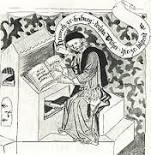
1390 - 1460 Person Name: H. von Laufenberg Author of "Lord Jesu Christ, our Lord most dear" in The Church School Hymnal for Youth Heinrich of Laufenburg was a native of Laufenburg, Aargau, Switzerland, The earliest notice of him is that in 1434 he was decan of the Collegiate Church of St. Maurice at Zofingen in Aargau. He afterwards held a similar post at Freiburg, in Baden; but in 1445 became a monk in the monastery of the Knights of St. John at Strassburg ("Zum grunen Werde"). He was living there in 1458, but probably died in that year or soon after (Koch, i. 213-214; Allgemine Deutsche Biographie, xix. 810-813, &c).
He was the most important and most prolific hymn-writer of the 15th century, and a number of his productions are of sweetness and abiding worth. Most of them are in honour of the Blessed Virgin Mary. Many are in intricate metres, while others are written to song tunes, or are recasts of songs, or translations from the Latin. A large number are included by Wackernagel in his second volume, principally taken from a paper manuscript of the 15th century, which he found in the town library at Strassburg.
Two of the best of his original hymns are:—
i. Ach lieber Herre Jesu Christ. Cradle Hymn. This beautiful prayer of a mother for her infant child is given by Wackernagel, ii. p. 534, in 5 stanza of 6 lines, from the Strassburg MS., where it is entitled "Benedictio puerily." In his Kleines Gesang-Buch, 1860, Wackernagel gives it as No. 114 (omitting stanza ii.) with the original melody, dating both 1429. The text is also in Hoffmann von Fallersleben, edition 1861, No. 125. Translated as:—
Ah ! Jesu Christ, my Lord most dear. A full and very good translation by Miss Winkworth in her ChristianSingers, &c, 1869, p. 93. The address to the B. V. M. in stanza ii.,
"Maria, müter Jesu Christ,
Sit du dins Kints gewaltig bist,"
is translated as:—
“Since in Thy heavenly kingdom, Lord,
All things obey Thy lightest word."
Her translation was adopted with alterations by the Rev. H. White in the Savoy Hymnary (Chapel Royal, Savoy), 1870, No. 35, beginning, "Lord Jesu Christ, our Lord most dear." Instead of taking the very good original melody, Mr. White altered the hymn to 6-8 metre, and omitted stanzas iv., v. This form has been repeated in the S. P. C. K. Church Hymns, 1871; Mrs. Brock's Children's Hymn Book, 1881, and others.
ii. Ich wollt dass ich daheime war. Eternal Life. A beautiful hymn of spiritual Home¬sickness. Wackernagel, ii. p. 540, includes a version in 13 stanzas of 2 lines from the Strassburg MS.; and another in 9 stanzas of 2 lines from a 15th century MS. at Berlin. Hoffmann von Fallersleben, 1861, gives the Strassburg text as No. 54; and a form in 9 stanzas from a MS. at Inzkofen, near Sigmaringen, dating 1470-1480, as No. 55. In his Kleines Gesang-Buch,1860, Wackernagel gives as No. 74 a slightly altered form of the Strassburg text, along with the original melody. Translated as "I would I were at last at home," by Miss Winkworth, 1869, p. 92. [Rev. James Mearns, M.A.]
-- John Julian, Dictionary of Hymnology
Heinrich von Laufenberg
James Freeman Clarke
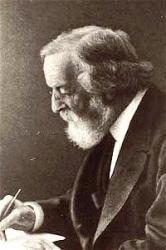
1810 - 1888 Person Name: J. Freeman Clarke Author of "For all thy gifts we praise thee, Lord" in Jubilate Deo Clarke, James Freeman, D.D., is a grandson of James Freeman (q. v.)> from whom he was named. He was born at Hanover, New Hampshire, April 4, 1810, and graduated at Harvard College, in Arts, in 1829, and in Divinity, 1833. Receiving ordination as a Unitarian Minister, he was Pastor at Louisville, Kentucky, from 1833 to 1840; of the Church of the Disciples, Boston, from 1811 to 1830; and also from 1853. Dr. Clarke for some time edited, whilst at Louisville, The Western Messenger, and is the author of Orthodoxy, its Truths and Errors, 1866; The Christian Doctrine of Forgiveness, 1852; The Christian Doctrine of Prayer, 1854, and other works. In 1844 he published the Hymn Book for the Church of the Disciples. This he enlarged in 1852. To each edition be contributed five hymns. Of these ten hymns five are found in the Lyra Sacra Americana The best known of Dr. Clarke's hymns are:—
1. Father, to us Thy children, humbly kneeling. [thoughts desired.] Dr. Clarke says this was manufactured from:—
2. Infinite Spirit, who art round us ever. [Holy thoughts desired], “which was written in Kentucky about 1833, and printed in the Dial soon after."
3. Brother, hast thou wandered far! [The Prodigal Son.] This appeared in his Disciples' Hymn Book, 1844, and is somewhat extensively used. It appeared in an Brother abbreviated form as, "Hast thou wasted all the powers?" beginning with stanza ii., in Hymns for the Church of Christ, Boston, 1853; Beecher's Plymouth Collection, 1855, and subsequently in others in Great Britain and America. The next three are also in one or two English collections.
4. To Thee, 0 God, in heaven. [Holy Baptism.] 1844.
5. To Him who children blessed. [Holy Baptism.] 1844.
6. Friend, whose presence in the house. [Christ's presence desired.] 1855. The beauty and value of this last hymn have been partly, and deserve to be more fully, recognized. It is found in Lyra Sac. Amer., which also has the following on "The Protestant Reformation":—
7. For all Thy gifts we praise Thee, Lord. This hymn was sung at the collation given by the Unitarians of New York and Brooklyn to the Members of the Convention assembled in the former city, Oct. 22, 1845. As originally written it contained 8 stanzas; the last two are omitted from both Lyra Sac. Americana and Putnam's Singers and Songs of the Liberal Faith. [Rev. F. M. Bird, M.A.]
--John Julian, Dictionary of Hymnology (1907)
James Freeman Clarke
Thomas Gisborne
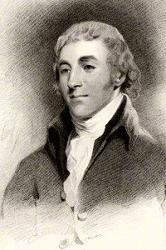
1758 - 1846 Person Name: Gisborne Author of "Saviour, when night involves the skies" in Good-Will Songs Thomas Gisborne was born at Derby, in 1758. He became perpetual Curate of Barton-under-Needwood, Staffordshire, in 1783, and Prebendary of Durham in 1826. He died in 1846.
--Annotations of the Hymnal, Charles Hutchins, M.A. 1872.
==================
Osborne, Thomas, M.A., son of Mr. John Gisborne, of Yoxall, was b. circa 1760, and educated at St. John's College, Cambridge, where he was 5th Wrangler of his year, and Chancellor's Medalist, graduating B.A. in 1780, and M.A. in 1783. Subsequently he became a Prebendary of Durham. He was the author of Sermons; the Duties of Men; the Duties of Women; Poems Sacred and Moral, 1799 (to the later editions of which his hymns were added), 3rd ed. 1803; and of another volume of poetry entitled, Walks in a Forest, 1795. The following hymns by him are found in the Uttoxeter Selection:—
1. A soldier's course from battles won. Soldiers of Christ. No. 72, in 6 stanzas of 4 lines, and in several hymn-books.
2. Hark! 'tis the bell with solemn toll. Death. No. 74, in 6 stanzas of 4 lines.
3. O Father, glorify Thy name. In Sickness. No. 92, in 5 stanzas of 4 lines.
4. Saviour! when night involves the skies. Christ All and in All. No. 80, in 4 stanzas of 4 lines.
5. Thy humblest works with full accord. Teachings of Nature. No. 118, in 4 stanzas of 4 lines.
6. When groves by moonlight silence keep. The hour of Peace. No. 116, in 4 stanzas of 4 lines.
All the above hymns, except No. 2, are in Gisborne's Poems, 3rd ed., 1803.
-- Julian, John, Dictionary of Hymnology (1907)
Thomas Gisborne
Samuel Medley

1738 - 1799 Author of "Awake, my soul, in joyful lays" in The Hymnal of the Evangelical Mission Covenant Church of America Medley, Samuel, born June 23, 1738, at Cheshunt, Herts, where his father kept a school. He received a good education; but not liking the business to which he was apprenticed, he entered the Royal Navy. Having been severely wounded in a battle with the French fleet off Port Lagos, in 1759, he was obliged to retire from active service. A sermon by Dr. Watts, read to him about this time, led to his conversion. He joined the Baptist Church in Eagle Street, London, then under the care of Dr. Gifford, and shortly afterwards opened a school, which for several years he conducted with great success. Having begun to preach, he received, in 1767, a call to become pastor of the Baptist church at Watford. Thence, in 1772, he removed to Byrom Street, Liverpool, where he gathered a large congregation, and for 27 years was remarkably popular and useful. After a long and painful illness he died July 17, 1799. Most of Medley's hymns were first printed on leaflets or in magazines (the Gospel Magazine being one). They appeared in book form as:—
(1) Hymns, &c. Bradford, 1785. This contains 42 hymns. (2) Hymns on Select Portions of Scripture by the Rev. Mr. Medley. 2nd ed. Bristol. W. Pine. 1785. This contains 34 hymns, and differs much from the Bradford edition both in the text and in the order of the hymns. (3) An enlargement of the same in 1787. (4) A small collection of new Hymns, London, 1794. This contains 23 hymns. (5) Hymns. The Public Worship and Private Devotion of True Christians Assisted in some thoughts in Verse; principally drawn from Select Passages of the Word of God. By Samuel Medley. London. Printed for J. Johnson. 1800. A few of his hymns are also found in a Collection for the use of All Denominations, published in London in 1782.
Medley's hymns have been very popular in his own denomination, particularly among the more Calvinistic churches. In Denham's Selections there are 48, and in J. Stevens's Selections, 30. Their charm consists less in their poetry than in the warmth and occasional pathos with which they give expression to Christian experience. In most of them also there is a refrain in the last line of each verse which is often effective. Those in common use include:—
1. Come, join ye saints, with heart and voice. (1800). Complete in Christ.
2. Death is no more among our foes. Easter.
3. Eternal Sovereign Lord of all. (1789). Praise for Providential Care.
4. Far, far beyond these lower skies. (1789). Jesus, the Forerunner.
5. Father of mercies, God of love, whose kind, &c. (1789.) New Year.
6. Great God, today Thy grace impart. Sermon.
7. Hear, gracious God! a sinner's cry. (1789). Lent.
8. In heaven the rapturous song began. Christmas.
9. Jesus, engrave it on my heart. (1789). Jesus, Needful to all.
10. Mortals, awake, with angels join. (1782). Christmas.
11. My soul, arise in joyful lays. (1789). Joy in God.
12. Now, in a song of grateful praise. Praise to Jesus. In the Gospel Magazine, June, 1776.
13. O could I speak the matchless worth. (1789.) Praise of Jesus.
14. O for a bright celestial ray. Lent.
15. O God, Thy mercy, vast and free. (1800). Dedication of Self to God.
16. O let us tell the matchless love. Praise to Jesus.
17. O what amazing words of grace. (1789). Foutain of Living Waters.
18. Saints die, and we should gently weep. (1800). Death and Burial. From his "Dearest of Names, Our Lord and King."
19. See a poor sinner, dearest Lord. Lent.
20. Sing the dear Saviour's glorious fame. (1789). Jesus the Breaker of bonds.
In 1800 a Memoir of Medley was published by his son, which is regarded by members of the family now living as authoritative. But in 1833 appeared another Memoir by Medley's daughter Sarah, to which are appended 52 hymns for use on Sacramental occasions. These she gives as her father's. But 8 of them are undoubtedly by Thos. Kelly, published by him in 1815, and reprinted in subsequent editions of his Hymns. The remainder are by Medley. Nearly all of these 52 hymns (both Medley's and Kelly's) have been altered in order to adapt them to Sacramental use. In Sarah Medley's volume, Kelly's hymns all follow one another, and three of them are in a metre which Medley apparently never used. What could have been Sarah Medley's motive in all this it is hard to divine. She is said to have been a clever, though unamiable woman, and was herself the author of a small volume of Poems published in 1807. In the Memoir she does not conceal her hatred of her brother. [Rev. W. R. Stevenson, M.A.]
-- John Julian, Dictionary of Hymnology (1907)
Samuel Medley
Ambrose Serle
1742 - 1812 Person Name: Ambrose Searle Author of "Thy ways, O Lord, with wise design" in Hymns and Tunes Serle, Ambrose, a Commissioner in the Government Transport Office, was b. Aug. 30, 1742, and d. Aug. 1, 1812. He published Horae Solitariae: or Essays upon some remarkable Names and Titles of Jesus Christ, &c, 1786. In this work short hymns are appended to some of the articles, and of these, "Jesus commissioned from above" (Redemption), and "Thy ways, O Lord, with wise design" (Providence), have passed into several collections. Serle was also the author of other works. The Rev. E. Bickersteth published Selections from the Works of Ambrose Serle, in 1833.
--John Julian, Dictionary of Hymnology, Appendix, Part II (1907)
Ambrose Serle
Samuel Gilman
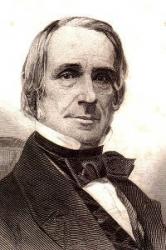
1791 - 1858 Person Name: S. Gilman Translator of ""This child we dedicate"" in Laudes Domini Gilman, Samuel, D.D., was born at Gloucester, Massachusetts, Feb. 16, 1791; graduated at Harvard, 1811, and was a tutor there from 1817 to 1819. In 1819 he became the pastor of a Unitarian congregation at Charlestown, South Carolina, and retained the same to his death. He died at Kingston, Mass., Feb. 9, 1858. His hymns include:—
1. 0 God, accept the sacred hour. Holy Communion. Contributed to Dr. Harris's Hymns for the Lord's Supper , July, 1820, republished in Sewall's Unitarian Collection, New York, 1820, and in later collections.
2. We sing Thy mercy, God of love. Holy Communion. Published as in the case of No. 1.
3. Yes, to the [that] last command. Holy Communion. Published as in the case of Nos. 1 & 2. [Rev. F. M. Bird, M.A.]
--John Julian, Dictionary of Hymnology (1907)
Samuel Gilman
Anton Wilhelm Böhm
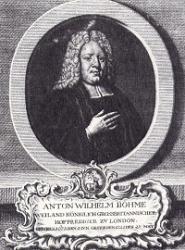
1673 - 1722 Person Name: Anthony W. Boehm, 1673-1722 Translator of "Of Him who did salvation bring" in The Methodist Hymnal Anton Wilhelm Böhm Germany 1673-1722 He was a German Lutheran royal chaplain at St. James Palace in London, having been educated at Lemgo and Hameln and at the University of Halle. He was known as an author and translator. In 1698 he was called to Arolsen to educate the t two daughters of the Count of Woldeck, but his religious opinions were not acceptable to some of the clergy there, and the count let him go. He took an offer to teach for German families in London.At this time he was frail and on a small income. After studying English, he opened a school in 1702. When Prince George of Denmark, at the request of Queen Anne, introduced the “Book of Common Prayer” into his Lutheran Chapel, Boehm was recommendedby his friend Heinrich Ludolf, Secretary to Prince George, to be assistant chaplain. He was to read the prayers, as the chaplain found them too hard to read. In 1705 he became chaplain to the prince. In 1712 he translated and published “Arndt's True Christianity”. He died at 48 in 1722 and ws buried in the Greenwich churchyard, where a monument was erected to his memory. Boehm was a prolific author. Besides works in German, he published translations and editions of other authors, including six treatises on Christianity and other manuscripts, published in 1731 by Professor Johann Jakob Rambach of Halle University.
John Perry
Anton Wilhelm Böhm


 My Starred Hymns
My Starred Hymns

